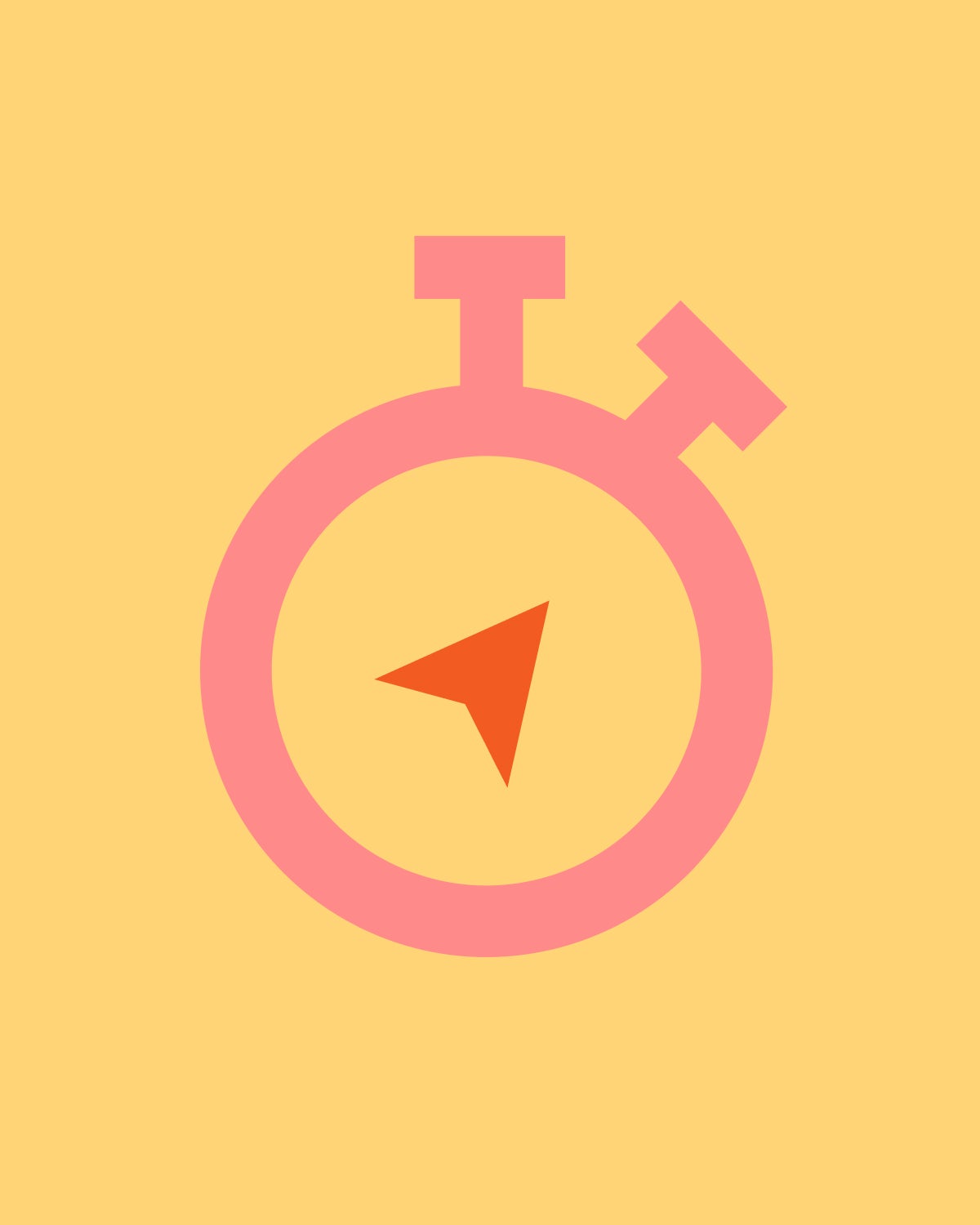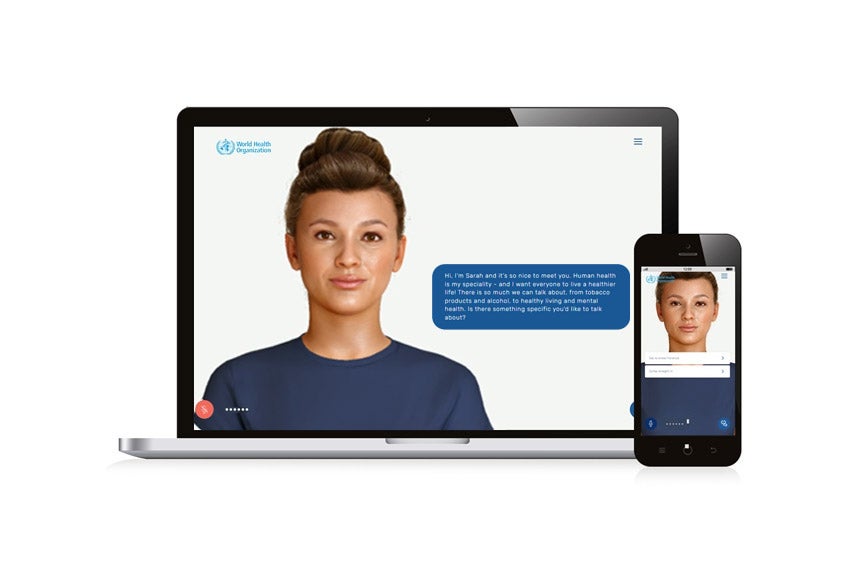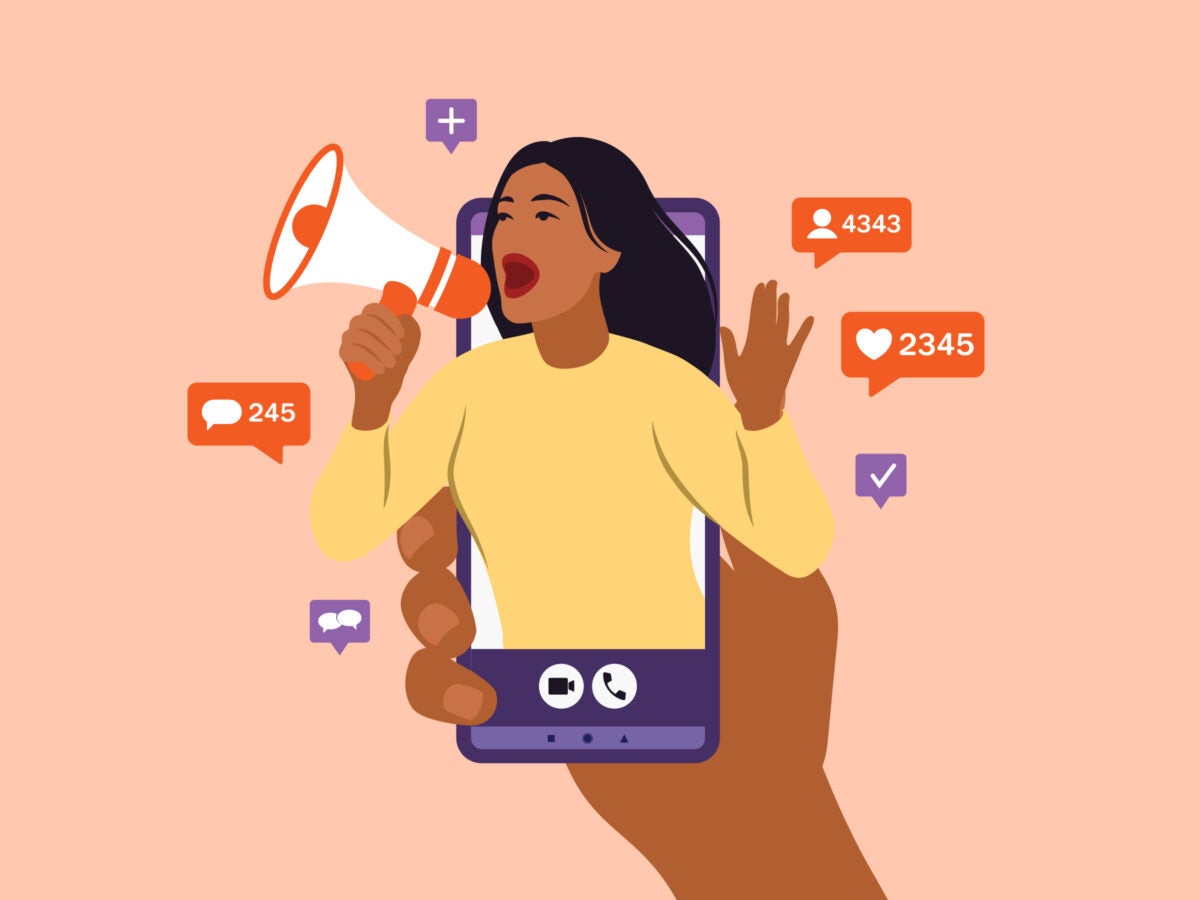
Feature
Elevator Pitch: Project S.A.R.A.H.
Project S.A.R.A.H. (Smart AI Resource Assistant for Health) is the World Health Organization’s assistant for people with questions about different aspects of health. Sarah (the AI’s pronouns are she/her) can discuss in eight languages topics like how to eat nutritiously, how to quit using tobacco and e-cigarettes, and how to reduce stress. She grew out of a pandemic project to promote health ideas during COVID-19. As that emergency waned, the WHO wanted to see if it could apply generative AI to address non-communicable health issues. Right now, Sarah is a prototype, but she could become a routine way for people to interact with the WHO. Harvard Public Health’s Michael F. Fitzgerald spoke with Rüdiger Krech, WHO’s director of health promotion.

World Health Organization
What public health purpose does your idea serve?
What we try to do with this is to provide accessible, reliable, and actionable health information to support people online. You can ask her anything about tobacco cessation, mental health, healthy lifestyles, alcohol consumption, or healthy nutrition. And you can engage with her in a discussion, face to face.
Who is funding this project, and do you have access to capital?
It’s a mix between governments, academic institutions, and private institutions. We receive voluntary contributions and have partnerships within [the WHO] and from Amazon Web Services, Google, George Washington University, and the government of Qatar. It’s difficult to say [how much it costs] because many things were in-kind contributions.
How do you get paid for it, and who are your clients or customers?
All our services are free of charge. All our projects start with an idea that we developed with partners. We are almost always dependent on external funding for any project we do. Normally we would say we need X dollars for a project. Here, we have a highly interested group of companies and partners.
Our audiences are very diverse: from policymakers to administrators in different sectors, different industries of the world—officials as well as the general public. [Sarah] scans millions of documents and WHO materials to provide concise and accurate summary answers, saving individuals hours of effort sifting through complex health guidelines.
What are your big obstacles?
The funding situation. We are dependent on external funding. But here we have a highly interested group of companies and partners as well.
Language is a problem. We would like her to speak many more languages and that requires a lot more resources.
On the technical side, we’ve seen so much misinformation and disinformation. We have more to do on training (the AI engine) and adjusting the guardrails. We’d like to continue building on this experience, to add more topics. That depends on where Sarah ends up going.
How do you show your value or impact?
We publish manuals that—for example, on mental health—outline how you actually deal with your depression. We measure, of course, how many times have these reports been downloaded. But we can’t say for certain if they have been read, and by how many people, once downloaded.
There are completely new people searching for information on the major websites and meeting Sarah. Interactions with people, by far, outweigh the downloads of these records. [Editor’s note: In the most recent six-month period, there were 200,000 visits to the Sarah landing page, leading to 70,000 conversations.] It’s much more accessible now for people to ask questions and get some answers.
We also have user surveys. Over 85 percent of respondents are saying that [Sarah] was good or excellent at helping them answer their health queries.
This is a novel way of looking at public health communications and information. We want to be at the forefront [of AI], on the cutting edge. WHO would like to be a global leader in guiding how this technology can support public health. Is Project S.A.R.A.H. something that could be licensed in some fashion to public health organizations around the globe to adapt for their own purposes, using AI with people in their communities? We’re not there yet because we haven’t fully understood many of the challenges that we’re still facing. [But] we’ve got something here, so let’s see where we go.

Republish this article
<p>The World Health Organization’s AI assistant aims to answer people's questions on different aspects of health.</p>
<p>Written by Michael F. Fitzgerald</p>
<p>This <a rel="canonical" href="https://harvardpublichealth.org/tech-innovation/elevator-pitch-project-s-a-r-a-h/">article</a> originally appeared in <a href="https://harvardpublichealth.org/">Harvard Public Health magazine</a>. Subscribe to their <a href="https://harvardpublichealth.org/subscribe/">newsletter</a>.</p>
<p class="is-style-default"><a href="https://www.who.int/campaigns/s-a-r-a-h" target="_blank" rel="noreferrer noopener">Project S.A.R.A.H.</a> (Smart AI Resource Assistant for Health) is the World Health Organization’s assistant for people with questions about different aspects of health. Sarah (the AI’s pronouns are she/her) can discuss in eight languages topics like how to eat nutritiously, how to quit using tobacco and e-cigarettes, and how to reduce stress. She grew out of a pandemic project to promote health ideas during COVID-19. As that emergency waned, the WHO wanted to see if it could apply generative AI to address non-communicable health issues. Right now, Sarah is a prototype, but she could become a routine way for people to interact with the WHO. <em>Harvard Public Health</em>’s Michael F. Fitzgerald spoke with Rüdiger Krech, WHO’s director of health promotion.</p>
<p></p>
<script async src="https://www.googletagmanager.com/gtag/js?id=G-S1L5BS4DJN"></script>
<script>
window.dataLayer = window.dataLayer || [];
if (typeof gtag !== "function") {function gtag(){dataLayer.push(arguments);}}
gtag('js', new Date());
gtag('config', 'G-S1L5BS4DJN');
</script>
Republishing guidelines
We’re happy to know you’re interested in republishing one of our stories. Please follow the guidelines below, adapted from other sites, primarily ProPublica’s Steal Our Stories guidelines (we didn’t steal all of its republishing guidelines, but we stole a lot of them). We also borrowed from Undark and KFF Health News.
Timeframe: Most stories and opinion pieces on our site can be republished within 90 days of posting. An article is available for republishing if our “Republish” button appears next to the story. We follow the Creative Commons noncommercial no-derivatives license.
When republishing a Harvard Public Health story, please follow these rules and use the required acknowledgments:
- Do not edit our stories, except to reflect changes in time (for instance, “last week” may replace “yesterday”), make style updates (we use serial commas; you may choose not to), and location (we spell out state names; you may choose not to).
- Include the author’s byline.
- Include text at the top of the story that says, “This article was originally published by Harvard Public Health. You must link the words “Harvard Public Health” to the story’s original/canonical URL.
- You must preserve the links in our stories, including our newsletter sign-up language and link.
- You must use our analytics tag: a single pixel and a snippet of HTML code that allows us to monitor our story’s traffic on your site. If you utilize our “Republish” link, the code will be automatically appended at the end of the article. It occupies minimal space and will be enclosed within a standard <script> tag.
- You must set the canonical link to the original Harvard Public Health URL or otherwise ensure that canonical tags are properly implemented to indicate that HPH is the original source of the content. For more information about canonical metadata, click here.
Packaging: Feel free to use our headline and deck or to craft your own headlines, subheads, and other material.
Art: You may republish editorial cartoons and photographs on stories with the “Republish” button. For illustrations or articles without the “Republish” button, please reach out to republishing@hsph.harvard.edu.
Exceptions: Stories that do not include a Republish button are either exclusive to us or governed by another collaborative agreement. Please reach out directly to the author, photographer, illustrator, or other named contributor for permission to reprint work that does not include our Republish button. Please do the same for stories published more than 90 days previously. If you have any questions, contact us at republishing@hsph.harvard.edu.
Translations: If you would like to translate our story into another language, please contact us first at republishing@hsph.harvard.edu.
Ads: It’s okay to put our stories on pages with ads, but not ads specifically sold against our stories. You can’t state or imply that donations to your organization support Harvard Public Health.
Responsibilities and restrictions: You have no rights to sell, license, syndicate, or otherwise represent yourself as the authorized owner of our material to any third parties. This means that you cannot actively publish or submit our work for syndication to third-party platforms or apps like Apple News or Google News. Harvard Public Health recognizes that publishers cannot fully control when certain third parties aggregate or crawl content from publishers’ own sites.
You may not republish our material wholesale or automatically; you need to select stories to be republished individually.
You may not use our work to populate a website designed to improve rankings on search engines or solely to gain revenue from network-based advertisements.
Any website on which our stories appear must include a prominent and effective way to contact the editorial team at the publication.
Social media: If your publication shares republished stories on social media, we welcome a tag. We are @PublicHealthMag on X, Threads, and Instagram, and Harvard Public Health magazine on Facebook and LinkedIn.
Questions: If you have other questions, email us at republishing@hsph.harvard.edu.


